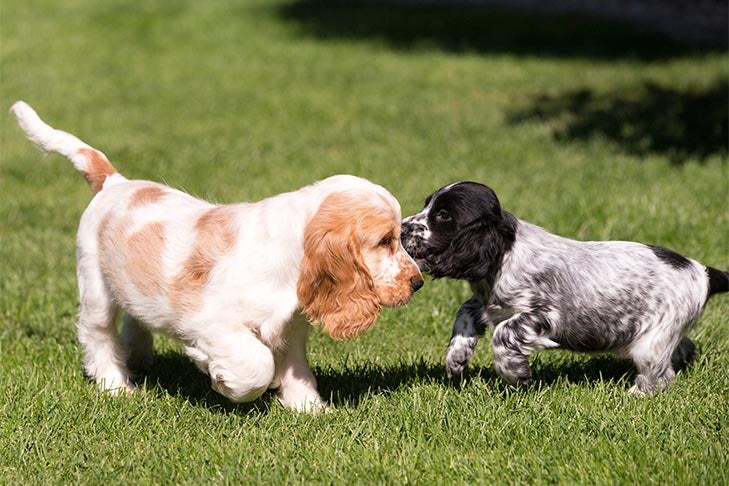
Most dog owners have no doubt heard about the importance of socializing their puppy. Proper socialization means providing positive experiences with as many new people, dogs, and situations as possible. It’s essential for developing a confident and well-adjusted adult dog that is comfortable with all life has to offer. Unfortunately, despite the significance, many people aren’t providing enough socialization for their young canine companions. New research from the Ontario Veterinary College at the University of Guelph shows that puppy classes are an important part of ensuring that your dog is properly socialized.
The researchers sampled 296 puppy owners across North America, giving them questionnaires when they enrolled in the study and again when their puppies were 20 weeks old. The results showed that nearly one-third of the puppies in the study received only minimal exposure to people and dogs outside the home. The researchers defined “minimal exposure” as interactions with up to five dogs and 10 people in a two-week period. That may seem like a full social calendar, but it’s nowhere near what a puppy needs for proper socialization. The researchers warn that a lack of socialization opportunities can lead to behavior problems down the road.
In his book, “Before & After Getting Your Puppy,” Dr. Ian Dunbar recommends that your puppy meet at least 100 different people in his first month at home. That should include individuals of different heights, ages, and ethnic backgrounds, as well as people with glasses, canes, hats, umbrellas, in wheelchairs, etc. One of the easiest ways to contribute to this necessary level of socialization is to attend puppy classes.
Almost half of the puppies in the present study attended puppy classes, and those dogs were exposed to more canine friends and people, including children, than the sheltered puppies that received only minimal exposure. Class participants were also more likely to expose their puppies to new situations involving loud noises, large trucks, and people at the front door.
As a result, those puppies that attended classes were less likely to show nervousness or have symptoms of separation anxiety. For example, they had fewer fear responses to things such as their crate or a vacuum cleaner.

There wasn’t just a difference between the pups. Owners who attended puppy class treated their dogs differently than those who did not attend a class. Attendees were more likely to reward their canine companion’s good behavior. They didn’t use verbal corrections as often and were far less likely to punish their dogs — redirecting negative behaviors instead. (For example, if a puppy is chewing on the furniture, they might redirect his attention to a chew toy.)
This has important implications. Dogs that are trained using positive methods, such as those used by the puppy class attendees, learn to enjoy training and develop an eagerness to please. Positive methods also foster trust and communication between owner and puppy, leading to a stronger bond. In keeping with other studies, the current research found that the owners who used punishment reported more fearful behavior in their pups. So, not only did the class-attending puppies gain valuable confidence, their owners learned training techniques that further prevented fear and anxiety in their dogs.
This research showed that puppy classes are an effective and essential component of socialization. But not all classes cover the same material. The researchers discovered that although more than 80 percent of the classes taught behaviors such as “sit” or “down,” only 70 percent allowed the puppies to play with each other. And, unfortunately, less than half covered experiences such as gradual exposure to noises or trading items to prevent resource guarding. So, choose your puppy class with care. Look for a curriculum with the maximum value for socialization — trainer supervised and controlled interaction between puppies to encourage proper dog-to-dog behaviors; exposure to new sights, sounds, and smells; and handling and restraint exercises. Talk to the instructor before enrolling, and ask if you can visit a class to ensure positive methods are used and that puppy playtime is conducted in a safe matter (i.e. larger, boisterous puppies are not allowed to bully smaller, shy ones).
Don’t ignore the power of proper socialization. Make sure that your new puppy has as many positive experiences as possible to build his confidence and develop his character. Even if you’ve trained dogs before, don’t skip classes. Your dog will learn more than basic obedience behavior — he will learn to feel comfortable out in the world!

